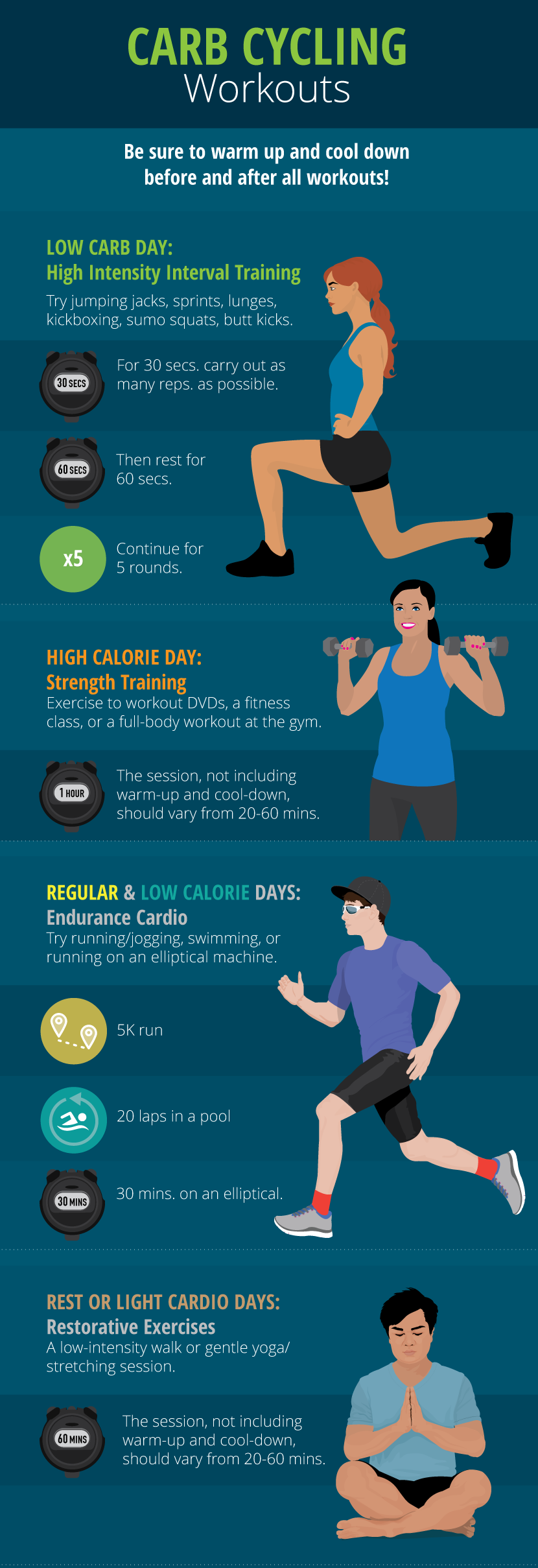Build exercise into your commute to and/or from work. Run, Cycle, Walk all or some of the journey. Get off the bus a stop early, park further from work, keep change of fresh clothes at work etc. Great for body and mind and saves money too.
Carb Cycling for Weight Loss and Improved Fitness



Fix have produced a definitive guide via an infographic with tips and advice on carb cycling and How it may help us with our health and fitness and weight loss. This blog summarises the detailed article on carb cycling as written by Katy Widrick. Thank you to Katelyn Green for providing this article and infographics.
Please click on the 3 infographic images to enlarge them and see a wide variety of information and concise detail on all things Carbohydrates, nutrition and exercise. The first infographic is a carb cycling plan. The second infographic gives the numbers of carbohydrates in food. The third infographic provides workouts that we can do on different carb cycling days.
Carb Cycling for Weight Loss and Improved Fitness
Weight loss diets are nothing new. And weight loss itself involves a fairly basic equation: burn more calories than you take in, and you will lose weight due to the calorie deficit. Of course, the factors that go into the equation include much more complex things like metabolism, the nutritional quality of different foods, a person’s current activity level, underlying medical issues that may put roadblocks in an individual’s way, and much more.
As simple as it seems, there are a number of different approaches to creating that calorie deficit, and more to the point, to creating a healthier, more balanced and more lifestyle-focused shift that enhances a person’s happiness and overall longevity, rather than just making cosmetics changes.
One diet and fitness plan that has picked up a lot of interest in recent years is known as carb cycling.
What is Carb Cycling?
Carb cycling is a diet during which you eat varying amounts of carbohydrates in any given day, based on a strict schedule.
What does the diet look like? The more popular any diet gets, the more variations of it there are, so rather than presenting one true carb cycling diet, it’s more helpful to look at the basic foundation that most participants build on, which is a five-day cycle.
Participants can pick and choose which foods they eat, as long as they fall within those basic nutrient breakdowns and ratios in the illustration above.
Some participants will cut out all gluten, dairy, soy, and alcohol, while others will merely try to limit those foods. Some will strictly track their food intake in order to perfectly meet the macros, or nutrient ratios, while others prefer using a simpler system (for example, Yuri Elkaim, author of the best-selling book The All-Day Fat Burning Diet, who recommends using portion sizes to come close to the ratios without actually measuring and tracking).
Unlike a fully low-carb diet, which can result in negative side effects (less energy, more cravings, a drop in exercise performance), cycling can, in theory, give the body regular metabolism boosts while still helping lower body fat and increase performance.
First made popular in the bodybuilding and figure competition circles among people keenly interested in dropping body fat and seeing quick physical changes, carb cycling has become more mainstream, and even some registered dietitians and nutrition experts are using a version of it with their clients.
However, Katie Heddleston, MS, RD, warns that the term carb cycling may be used differently by different people, and always, it’s important to work with an expert who can tailor the plan to your specific needs and goals.
What the mainstream media and fitness industry refer to as "carb cycling" is technically "food cycling," Heddleston tells me. “This type of diet takes focus and diligence, as there is a lot to keep track of during each day of the five-day food cycle.” She goes on to say, “For what I teach and do as a dietitian, this type of food cycling isn't one I do with my clients. However, I do appreciate a cyclic diet. Our bodies are not static, so our diets shouldn't be static. In the version of carb cycling I do with my clients, we focus in on cycling the carb amounts for each day, pairing them appropriately with a workout that requires that particular amount. For instance, a long run day or a heavy leg lift day, would utilize a higher amount of carbs. My method removes a bit of guesswork and avoids extremes, such as a 24-hour fast.”
It’s important to note: carbs themselves are not bad. In fact, they’re an important part of a balanced, healthy diet! Carbs help us have the energy we need to work and play and they can also help with recovery after workouts. Without them, we can experience mood swings (as anyone who has ever cut carbs for even a single day can attest). Plus, carbs are in some of the most delicious foods and snacks, and cutting out the things that bring us joy can make for an unsustainable diet plan.
But as with any nutrient or food source, there are choices that are better than others, at least in terms of meeting the goal of a healthier, more fit life. For carbs, it comes down to simple vs. complex as well as foods that naturally have higher or lower carbs.
Who Can Carb Cycling Work For?
Because of the varied carb intakes over the plan, there are several benefits that can happen to your body, including replenished glycogen stores (which means when you’re working out, you can do so at a higher intensity for longer periods of time), temporary spikes in insulin levels, which can help protect and rebuild muscle tissue, and maximized fat burning so that even after you’re done working out, your body continues to work efficiently on your behalf.
The takeaway is that carb cycling can help build muscle, drop body fat, and improve performance.
And while it has restrictions, it is not as restrictive as other plans, which means it may be a fit for people who are not ideally suited to other diets, including those with diabetes, high blood pressure, hypothyroidism, etc.
Carb cycling can help people break through weight loss plateaus, for example, or help someone overcome unhealthy food cravings without feeling deprived.
Finally, because this is meant to be a lifestyle change and not just a short-term diet, people who follow a carb cycling plan may find that they can stay on it forever, or take short breaks before resuming it again.
What do The Experts Say?
It’s mixed! An Arizona State University study found that a low-carb diet offered no weight loss advantages when compared to a more traditional diet that features a calorie deficit but no specific rules on nutrient ratios (the study did not look specifically at cycling, with a mix of high- and low-carb days). But it’s important to note that carb cycling is not a low-carb diet, and even if it helps a person lose weight, it may not result in more rapid fat loss.
Others warn that any type of diet that restricts a certain type of food, nutrient, or other dietary behavior is a slippery slope, and that even if it’s successful for a short period of time, lifestyle changes are more effective than diets.
Many of the reviews of carb cycling are anecdotal. With any diet or nutritional plan, it’s smart to set wellness goals rather than physical appearance goals. I’m a big believer in non-scale victories, which have nothing to do with a specific weight or clothing size – things like “I can run further than I could before,” or “I was able to sit more comfortably in an airplane seat.”
Although of course, please consult with a medical professional before starting.
- http://katieheddleston.com/carb-cycling/
- http://heidipowell.net/2713/carb-cycling-101/
- https://yurielkaim.com/carb-cycling-for-fat-loss
- http://www.precisionnutrition.com/all-about-carb-cycling
- http://www.bodybuilding.com/content/top-5-facts-you-should-know-about-carb-cycling-and-fat-loss.html
- http://dailyburn.com/life/health/carb-cycling-meal-plan/
- https://legionathletics.com/carb-cycling/
- https://www.muscleforlife.com/the-definitive-guide-to-carb-cycling/
Personal Training Blog & Resources
-
On: 1 Nov 2016 - 16:05
-
On: 17 Jan 2021 - 05:53
-
On: 15 Jan 2020 - 16:09
-
On: 15 Jan 2020 - 15:42
-
On: 19 Jul 2019 - 19:20


Add new comment